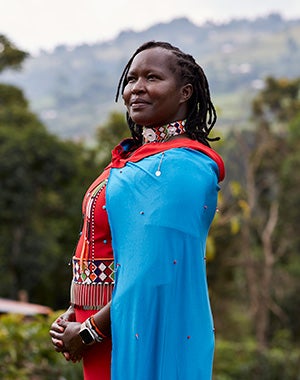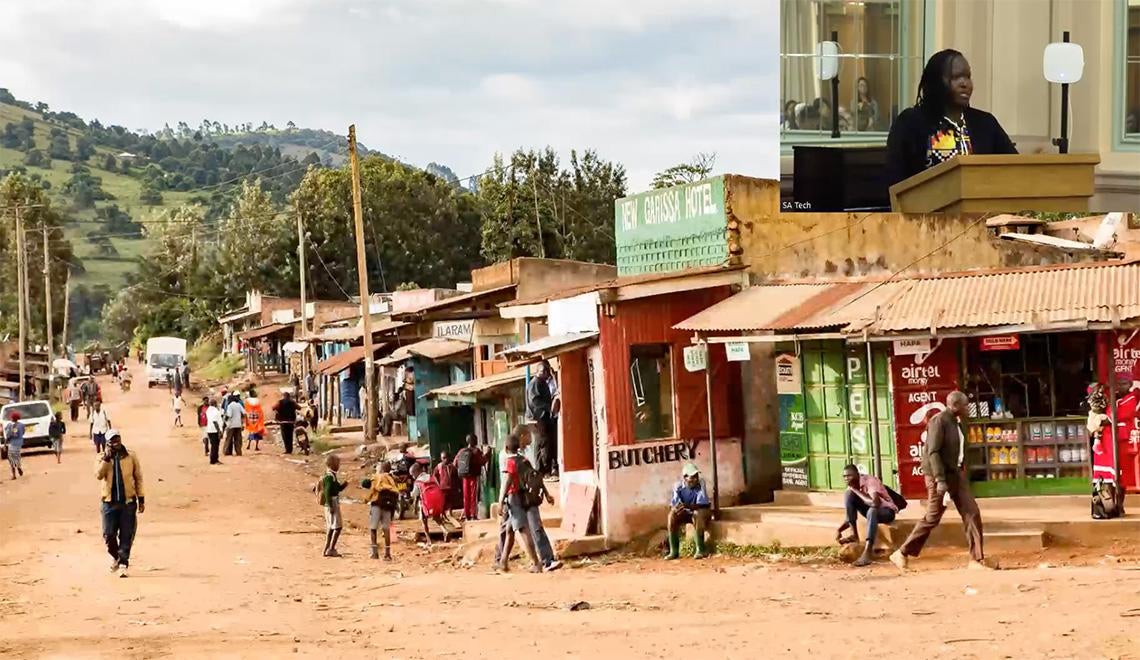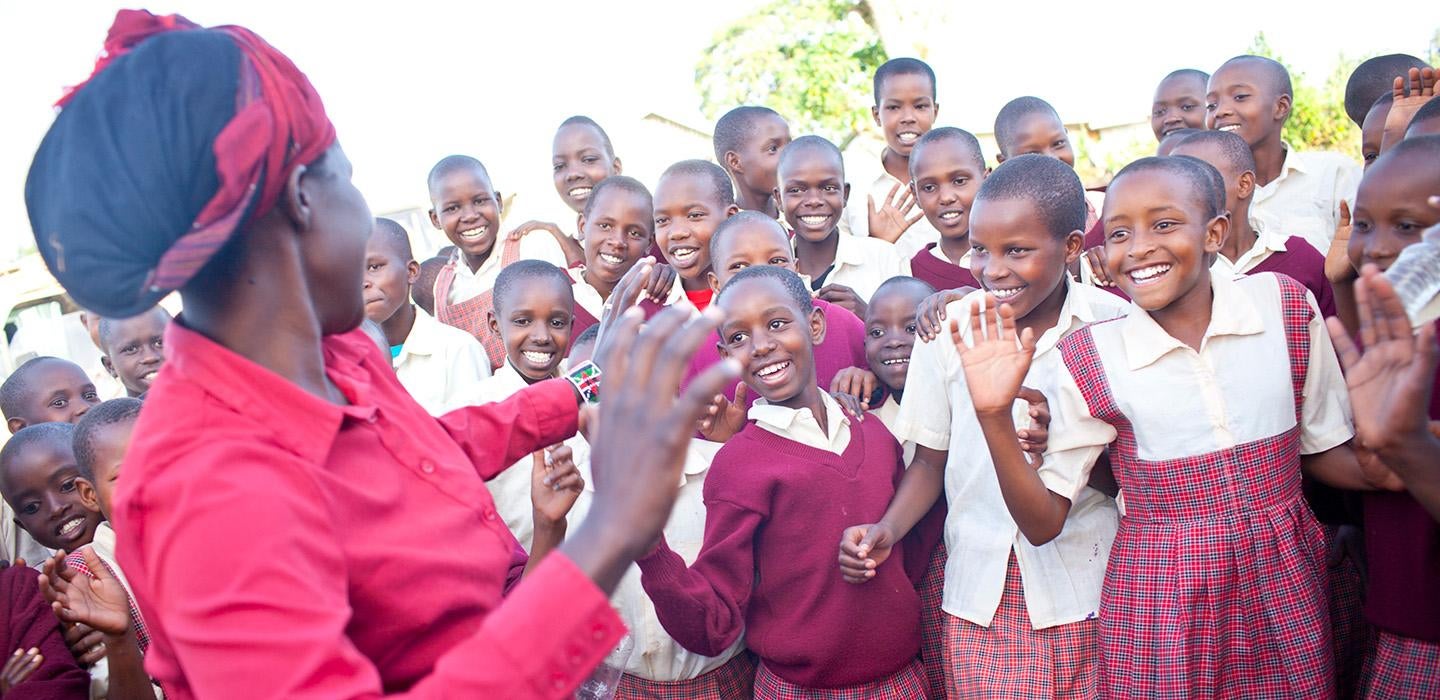
Subscribe to Pittwire Today
Get the most interesting and important stories from the University of Pittsburgh.Kakenya Ntaiya made it her mission to prevent others from experiencing female genital mutilation (FGM) and child marriage.
A global educator and activist, Ntaiya (EDUC ’11G) supports the health of women and girls through Kakenya’s Dream, a nonprofit she founded in 2009 while pursuing her doctorate at the University of Pittsburgh.
The organization invests in girls from rural Kenya through education, health, leadership and self-defense initiatives, including two boarding schools for those most at risk. The schools and a support program for their alumni have provided nearly 1,000 girls with educational, financial, academic and social support in their transitions to high school and university in communities where only 17% of women completed elementary school and 10% finished high school.
“Think about the young people who’ve gone through our programs. What they’ll be able to do is beyond what we can imagine. If we don’t [continue to] break the silence, it will continue for generations to come,” Ntaiya told Pittwire in an April interview.
Kakenya’s story
When she was 5, Ntaiya, an Enoosaen village native, was engaged to be married. Desiring a different trajectory for her life, she approached her father with a proposal.
 “I did go through FGM — to escape child marriage and continue with schooling, eventually getting a scholarship to go to school in the U.S.,” she said, recalling threatening to run away if she couldn’t continue learning. “If I didn’t [undergo FGM], he would have faced public shame, stigma and ridicule in the community.”
“I did go through FGM — to escape child marriage and continue with schooling, eventually getting a scholarship to go to school in the U.S.,” she said, recalling threatening to run away if she couldn’t continue learning. “If I didn’t [undergo FGM], he would have faced public shame, stigma and ridicule in the community.”
Though illegal in Kenya, the nation remains one of 30 countries in Africa, Asia and the Middle East, where FGM, also known as cutting, is concentrated and practiced on girls from infancy to age 15, according to the World Health Organization. The organization defines FGM as all procedures involving partial or total removal of the external female genitalia or other injuries to the female genital organs for nonmedical reasons that yield no health benefits. While girls are one-third less likely to undergo FGM today than 30 years ago, the 2021 United Nations Population Fund’s Annual Report warns that 475,022 Kenyan girls remain at risk through 2030.
Outcomes can be dire: death from excessive bleeding or infection, childbirth complications, lifelong physical pain, and mental and emotional trauma, according to anti-female genital cutting group Orchid Project.
But FGM continues in Kenya and beyond, Ntaiya said, because of a disconnect between policymakers and practicing communities.
“The Maasai people, we’re very, very traditional and that sets expectations for women and men that drives certain expectations for girls and boys,” Ntaiya said. “It’s a form of control for women. [But at Kakenya’s Dream], we want to ensure women don’t have to experience physical pain for years [or] the internal pain that you’re not complete.”
Ntaiya said her mother is her hero, having jeopardized her safety to provide Ntaiya, the oldest of eight children, as well as her five sisters, with a nurse following FGM to ensure they properly healed.
A major challenge currently facing Kakenya’s Dream is an uptick in the medicalization of FGM, where a community nurse does the procedure, though it is still “underground.”
“[They] can eliminate the transmission of diseases and infections using a clean knife, eliminate bleeding too much because it’s done in a medical facility, but the long-term harm is not eliminated,” Ntaiya said.
She wants to be sure young people have the services they need and hopes to expand with a youth health care facility before the end of the year.
“There's a lot of stigma, when they go to the government health center, that the government has, so we want to have them in a stigma-free [environment] with access to whatever information young people need — counseling, medical doctors, their resources, books, gynecologists, whatever they want and should be able to have.”

Organizational impact
Kakenya’s Dream has educated nearly 25,000 girls and boys about human rights and sexual violence.
“Empower girls and boys,” said Ntaiya. “When society tells a 9-year-old, ‘This is how you behave,’ we start to show her what else is possible. You must [also] change the mindset of boys from a young age [and] remove those beliefs so the next generation can be free from harm.”
In March, Pitt’s Johnson Institute for Responsible Leadership, Ford Institute for Human Security and the University Center for International Studies welcomed Ntaiya to campus to recognize her work advancing gender equality globally with an Exemplary Leader Award.
The honor is added to a long list of accolades, including being the first woman from her village to attend university in the U.S.; being recognized in Bill Gates’ 2022 “Heroes in the Field” series, Melinda French Gates’ book “The Moment of Lift” and Newsweek’s “150 Women Who Shake the World”; and receiving numerous awards, including Top Ten CNN Hero, National Geographic Emerging Explorer and Pitt’s Sheth International Achievement Award, given to alumni for their contributions around the world.
Amid her success, she hasn’t hesitated to praise the women who inspired her, among them the Graduate School of Public and International Affairs’ Carissa Schively Slotterback and Müge Kökten Finkel, and Renée and Richard Goldman Dean of the School of Education Valerie Kinloch.
“Valerie is the current dean of the School of Education, [and] I feel very honored to see that,” she said. “For a woman of color to be in such a position, it takes a lot of guts and focus, and you must prove that you can do the work. [But] Pitt people are just lovely people. We’re all part of the team of changing norms, cultures and perceptions.”
While visiting campus in March, Ntaiya presented a lecture to students and told them public service is challenging — but worth it — and advised on ways to turn goodwill into action.
“It’s about framing a dream, building a strong network of young people, forgetting yourself and [considering] what problem in this world you can change,” she said.
“Public service can be incredibly difficult but also incredibly inspiring.”
Photography courtesy of Kakenya Ntaiya


